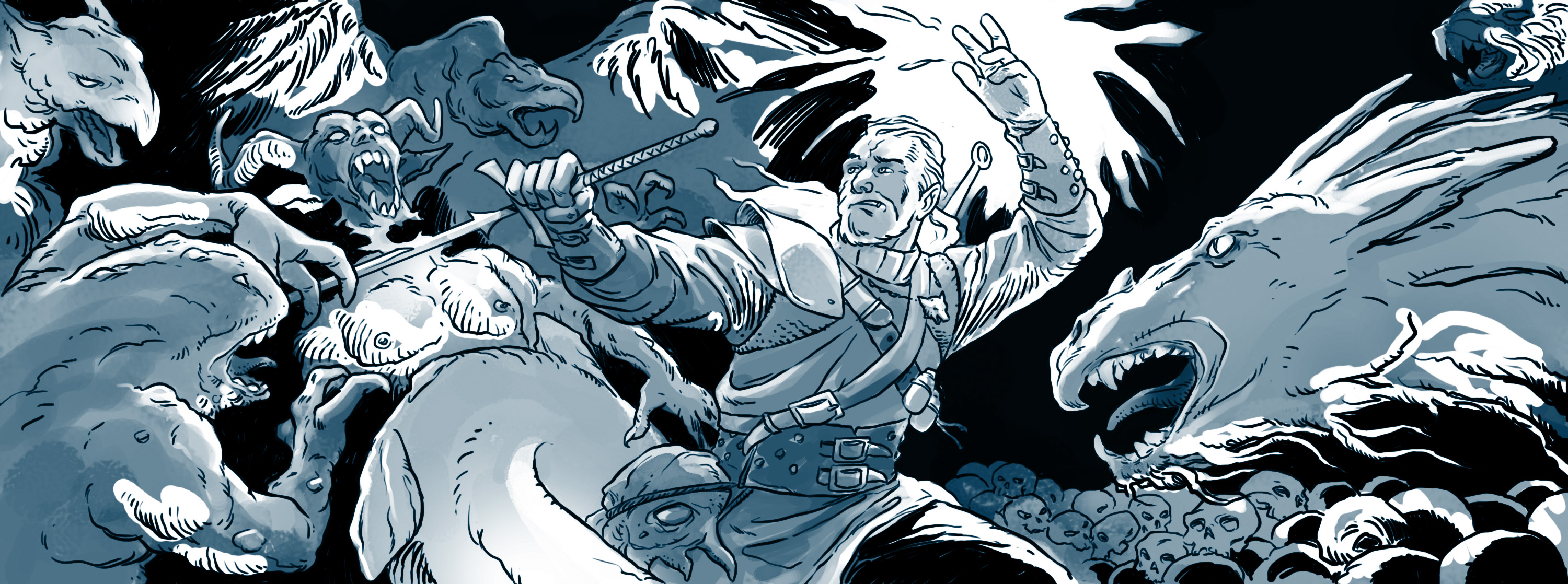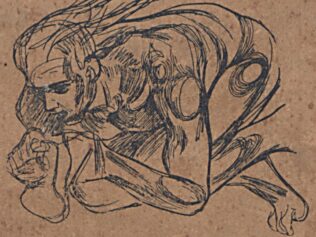
The success of The Witcher by Andrzej Sapkowski – impressive print runs, dozens of translations, the world-famous video games, a comic book series, and now also a keenly-awaited Netflix show – might blind us to an important fact: at the very source of it all, there is not some efficient marketing campaign, a cleverly-engineered fad, or massive promotional funding, but brilliant writing and the vision of just one man.
The ascent
The success of the most popular Polish fantasy series did not happen overnight. And the very fact that this success ever happened could be considered a miracle.
Sapkowski’s first short story, titled simply “The Witcher”, was published in 1986 in Fantastyka magazine, the only national fantasy and science-fiction magazine in Poland of the late-communist era. The author, back then unknown to anyone, submitted his short story to a recurring literary competition. The story took home the third-place award, which was a big success considering that the editorial team consisted of hard-core sci-fi fans who, by default, approached fantasy with some distrust. The next short story saw daylight two years later, and it took another year before the third one came out. No wonder why – Sapkowski worked as a sales representative in the fur trade and had other things on his plate, and on top of that, Fantastyka’s policy did not allow the publishing of one author too often. Then the year 1989 happened, bringing along a great political shift and spontaneous capitalism in Poland, which in turn caused a crop of new publishing houses to pop up one after another. Street stalls were groaning under the weight of popular and genre fiction that had never been available in Poland before, either because of censorship or financial limitations. A major part of that literary flood was the fantasy genre. The only trouble was that the only kind of fantasy books the market was interested in turned out to be translations, and almost exclusively from English; Polish authors were hardly getting published because nobody wanted to read them. What for, when you knew all the good books came from abroad anyway?
But Sapkowski kept on chiselling more short stories about Geralt the Witcher. In 1990, a rather ephemeral publishing house released an anthology that included several of them, allegedly without the author’s knowledge or permission. Sapkowski’s real The Witcher book debut was the publication of a set of new short stories in the 1992 volume Sword of Destiny from the SuperNOWA publishing house. And this was Sapkowski’s miracle, a double one even. First, someone decided to publish Polish fantasy; and second, it sold like hotcakes. Soon, the next book, The Last Wish, was released. It included earlier stories and two brand new ones, after which Sapkowski – seeing the collapse of the Polish fur industry – set off to write the five-volume Witcher Saga. The rest is history.
One important detail remains: while SuperNOWA prided itself on its honourable past of being part of the anti-communist underground press, it lacked the resources or funding to provide the author with proper promotion. It was the pre-internet era, and genre literature was not reviewed in the press. The news of Sapkowski’s books travelled by word of mouth. After a while, some of the more open-minded journalists caught wind of this literary phenomenon, and by the time the media started writing about the series, it was already mainstream literature. The Witcher turned out to be a case of absolutely spontaneous, grass-roots success. And as it entered the 21st century, it gained international fame of unprecedented scope. But why, actually?
The language
The answer is plain and simple: Sapkowski is a brilliant writer. And what makes a great writer truly great? Writing is a craft like any other, and just like all the other skilled traders out there, a writer must be judged by how well they execute their work. Every piece of literature is made of language and needs a proper structure: the plot, dialogue, characters and the relations between them, what kind of story they make, and where it takes us. And whichever way we look at Sapkowski’s prose, we have to admit that he has mastered all of those components.
Let’s take a look at the language. The word that comes to my mind straight away when thinking of The Witcher’s prose is ‘juicy’. Sapkowski uses very rich language, knows how to construct unconventional sentences, never forgetting to throw in a lexical treat. And on top of that, he feels completely at home even in the most diverse registers. Let’s take the extensive opening scene from Blood of Elves, the first instalment of the Witcher Saga. Dandelion the bard is sitting by the great oak, singing a ballad for the resting travellers, and once he takes a break, the listeners start to talk with each other. Among those taking part in the dispute, we have a learned wizard, elves acting all aloof and sophisticated, some minor noblemen, merchants, robust and foul-mouthed dwarves, and simple, sheepish peasants. Each race, nation, social class and gender are defined by their distinctive language: the wizard speaks wisely, the elves are courtly, the dwarves are earthy and bawdy, the merchants are frank and plainspoken, while the peasants’ speech is thick with dialect. In just a dozen pages or so, the author manages to present his linguistic finesse and extraordinary ear for language. More than once, Sapkowski brought up his great fascination with Henryk Sienkiewicz, and it makes a lot of sense indeed. We could criticize Sienkiewicz – our classic historical novelist – for many ideological and nationalist trespasses, but it’s impossible to accuse him of a lack of narrative flair. Sapkowski seems to be a worthy successor to this noble art of storytelling, only revamped and fluffed up with some modern spark, but without any cheap bling.
The engineering
Another vital element of literary work – other than language – is the construction of the plot; this meticulous engineering process that requires aptitude in spinning the action and building each scene. And once again, Sapkowski turns out to be a virtuoso who has full and utter control over the literary fabric he is weaving.
He proves it with absolute clarity in his short stories, especially those from The Last Wish, which are truly autonomous (in Sword of Destiny, one can already sense that while the book is a series of novellas, they are starting to form a larger entity). Each of the stories somehow refers to well-known folktale tropes – in “The Witcher”, we get a daredevil who fights a striga; “A Grain of Truth” is a variation on Beauty and the Beast; “The Lesser Evil” echoes with the princess in a tower motif, while the book’s titular story, “The Last Wish”, is a play on the ‘genie in a bottle’ trope that still manages to present the events from a different, surprising and very refreshing angle. In these stories, Sapkowski comes across as a bright pupil of Bruno Bettelheim, Angela Carter, and the long tradition of ambitious Anglo-Saxon fantasy literature, proving that seemingly weary and frayed tropes can still address current problems and phenomena. These novellas are also a masterclass in structural writing: sparingly written, they are made of just a few scenes each, echoing with refraining motifs, perfectly timed, and always ending right on the mark. In my opinion, “A Question of Price” is the crowning jewel in the collection. If we devour the story too hastily, we might overlook the fact that it consists of just three scenes – two short ones (the opening and closing) and one long one that takes up almost the whole novella, being just a conversation at a feast table. And yet, so much is happening there; so many twists and turns, layer upon layer of literary treats! It also shows us the real secret weapon of Sapkowski’s prose is his dialogue: perfectly composed, dynamic, and letting the reader enter the world of the novel so easily that the pages just flutter by.
In the Witcher Saga, taking up five novels and over two thousand pages, the construction had to be very different, of course, but Sapkowski proves to be as skilled and confident when taking broad strokes as he is with short forms. While action hurtles ahead, the author knows how to make time for subplots, moments of contemplation, a side episode, or diving deeper into character development. And you can always tell a seasoned writer by how they create individual scenes. Take the one where Geralt meets the sorceress Yennefer: these two have a long romantic history, but also a track record of misunderstandings, and they haven’t seen each other in a good while. What could be easier than to put the lovers together and make them discuss their situation? The trouble is, such dialogue could easily slip into banality. Sapkowski does something different still. He takes a step back, not letting us overhear the conversation, and instead, he lends a voice to an old man and a child watching the scene. It is the old man who explains the situation, not the characters. As for larger plot sequences, Sapkowski knows how to turn them into ingenious scenes. When it comes to a great battle, we follow it from the perspectives of a strategist, a low-ranking soldier, a random witness, and medics from the hospital tent (which is where the battle reveals its full form). At other times, the author lets us take a look at an event from the distance of years or decades; in a blink of an eye, he rips us out of the live action and takes us many decades into the future so that we can view the whole thing as if reading an entry in a history textbook.
And finally, the characters. From the dawn of literature, readers have always fallen in love with books whose characters managed to spark some emotional attachment. Sapkowski constructs his main characters out of mixed archetypes – he wrote once that all fantasy literature stems from the Arthurian legend, and indeed, the protagonists in The Witcher seem to be made of the same cloth, enriched with the individual character traits of modern people. Geralt is a monster-slaying expert with high environmental awareness. The beautiful and powerful Yennefer is hiding a shameful identity. Dandelion is a mythomaniac lecher and drunk, but also a true artist and a loyal friend at the same time. Geralt, Yennefer and Ciri are full-blooded fantasy characters, also making for a contemporary patchwork family, while the Witcher’s entanglement with the sorceress breaks the walls of literary stereotypes around romance. In the background, we get dozens if not hundreds of secondary characters who often turn out to be no less memorable – such as the poor royal messenger Aplegatt, whom we meet only in the first chapter of Time of Content, and who still makes me feel sad whenever I remember him.
What is it all about?
Sapkowski himself often stresses the fact that in his mind, all the scenes, characters and plot points have one purpose and one only: to push the action forward. By making this claim, the author clearly announces that his books are nothing but plain entertainment.
But don’t believe him. I mean, Sapkowski’s novels are entertaining for sure, but there is definitely more to it. The Witcher Saga, spanning from Blood of Elves and ending with Lady of the Lake, is a great political pentalogy about power and war, and how those two forces affect regular people. It is a brilliant study of international conflict and the fates of individuals who fall in the cogs of great machinations. His is an expansive saga about ideals and cynicism, nationalism, xenophobia and propaganda. Such references as the slaughter of non-humans or ghetto benches are not accidental slips or empty allusions; I would go as far as to insist that the whole series has the clear mark of the author’s Central European roots. And on top of that, as I mentioned before, the series is a story of the people and their problems – both very different and very similar to us and ours.
In this sense, Sapkowski’s writing was a significant step forward in the development of global fantasy literature. All too often, this genre settles for perfunctory plots nestled in Tolkienesque worlds, getting stuck in conventional structures (just like, let’s admit it, all kinds of literature; each genre consists of a brilliant few and derivative masses). Sapkowski never shies away from fantasy traditions, but he uses the genre to create a rather serious story that is multidimensional, psychologically developed, rich in its own history and philosophy, and far from the gleeful ethical explicitness of the great J.R.R. Tolkien – the issues of good and evil as presented in The Witcher are pretty much as complex as they are in our own world.
The originality of Sapkowski’s world was also influenced by his background: Polish fans like to stress the Slavic-ness of the series, exploited mainly in its demonology, but also visible in the material and cultural layers of the story. The truth is, our local mythology and folklore occurs throughout The Witcher sporadically at best, providing nothing more than an attractive flavouring. The writer himself mocked the concept of the ‘Slavic fantasy’ back in 1993. In a well-known essay published in Nowa Fantastyka, titled “Piróg, albo nie ma złota w Szarych Górach” (Piróg, or There Is No Gold in the Grey Mountains), Sapkowski wrote that such a thing is inherently impossible, as no pre-Christian archetypes or models have survived, and all pagan-flavoured folktales and legends have been “gelded by various Catholic preachers”. Therefore, Slavic tropes do appear in the series, but they provide nothing but seasoning for a soup made of completely different ingredients.
More than just The Witcher
Of course, there are people out there who are severely allergic to stories about guys with swords, dragons and elves, which turns out to be a big obstacle when trying to read Sapkowski’s prose. Some would say it’s their loss, but let’s not forget that the author has penned more than just stories for The Witcher series. Why not try the historical (okay, with a touch of fantasy) Hussite Trilogy, which starts with Narrenturm? Or maybe the standalone novel Żmija (Viper), which takes place during the Soviet-Afghan war? Or perhaps the other short stories, such as Złote popołudnie (The Golden Afternoon). Yes, it’s a good route for the fantasy-intolerant: the novella toying with Alice in Wonderland motifs is Sapkowski at the very peak of his literary abilities, producing a structural and linguistic gem that remains a fairytale unafraid of tackling some very serious topics. That’s Sapkowski in a nutshell for you.
Translated from the Polish by Aga Zano










